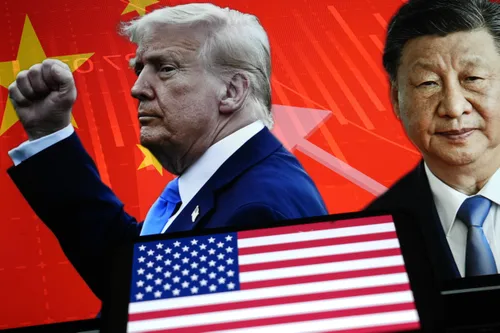Tensions between the world’s two largest economies have escalated dramatically as China slapped a retaliatory 125% tariff on U.S. imports Friday—just days after President Donald Trump announced a 145% tariff on Chinese goods.
Caught in the middle are the businesses and workers fueling the $582.4 billion trade between the two nations, with Chinese exporters—many of them based in the global trading hub of Yiwu—facing the brunt of the fallout.
Yiwu, in eastern China’s Zhejiang province, is home to the world’s largest wholesale market, and for many vendors there, the future now looks uncertain.
“At worst, we just quit,” said Jiang Jiayu, owner of Yiwu Jiayu Festive Supplies Co., a producer of party poppers. “American customers would normally be placing Christmas orders by now. But there’s no sign of them. We’re not going to lose money just to keep this market.”
Jiang, who relies on U.S. clients for about 10% of her business, questioned whether the U.S. could realistically replace Chinese goods. “Ordinary people are the ones who will get hurt the most by the tariffs,” she said.
A Blunt Economic Blow
The new tariffs have already disrupted supply chains. Wu Liying, owner of Xinyue Socks Co., echoed the concern:
“Our clients will have no profit to make, and neither will we. If nobody makes money, win-win cooperation no longer exists.”
Down in Dongyang, Guangzhou province, Margaret Zhuang, a foreign sales employee at a wooden kitchen supplies factory, said her American buyer cancelled production the moment tariffs were hiked—despite paying a deposit.
“It’s worse than in 2018,” she said. “At least back then there was hope of negotiation. Now, it’s like the U.S. wants to sever ties completely.”
Zhuang worries about losing her job and said her 40 colleagues are now facing a halt in work, with no backup income.
Strategic Shifts and Global Ripples
Ding Dandan, who exports Christmas decorations, remains cautiously optimistic in the short term.
“Ninety percent of Christmas-related goods in the U.S. come from China. If we don’t export, where else will they buy from?”
Ding and others are exploring ways to reroute exports through third-party countries like Mexico to bypass direct U.S.-China tensions.
However, the broader concern remains: many Chinese exporters now fear that long-term demand from U.S. buyers could evaporate, leading to factory closures and widespread job losses.
Global Economic Shockwaves
The tit-for-tat tariff war has already rattled global markets. Wall Street has seen its steepest declines since the pandemic, and analysts warn of a looming global recession.
“This trade war is no longer about negotiation leverage—it’s an economic scorched-earth policy,” said trade economist Dr. Cheng Lei of the Shanghai Institute of Finance. “Small businesses will collapse on both sides.”
As Beijing and Washington continue their trade hostilities, thousands of small exporters, like those in Yiwu, are now scrambling to adapt or prepare to shut down entirely.
The Bottom Line
The latest tariffs are not just geopolitical maneuvers—they are deeply personal economic shocks, upending the livelihoods of workers from Zhejiang to Iowa. As the two superpowers dig in their heels, it’s becoming clear: in this trade war, everyone pays.



